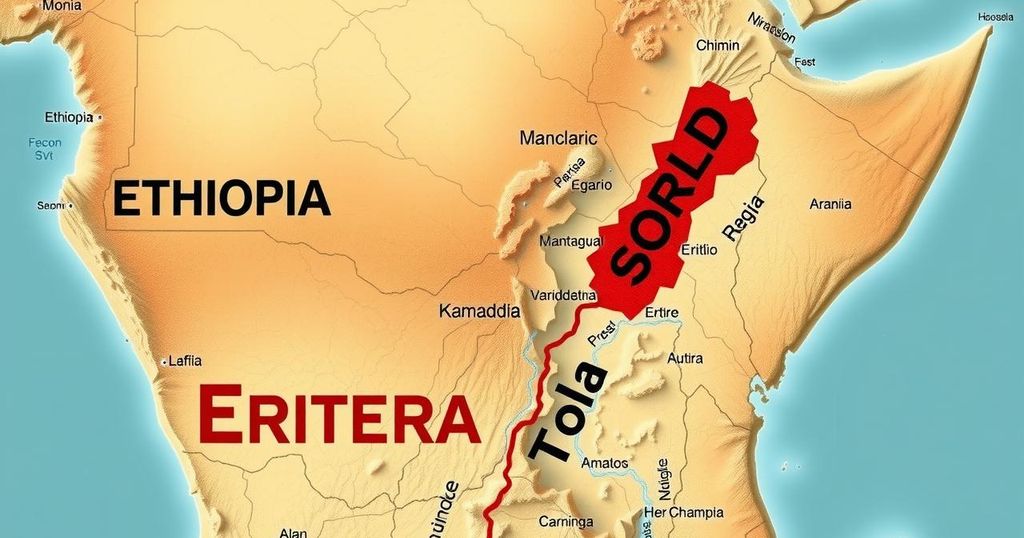Urgent Warning of Imminent War Between Ethiopia and Eritrea by Lt. Gen. Tsadkan
Lt. Gen. Tsadkan Gebretensae warned that war between Ethiopia and Eritrea appears imminent, with Tigray potentially becoming the battleground. He decries deteriorating relations and calls for urgent peace efforts, citing internal divisions within Tigray and accusing Eritrea of destabilizing influences. Tsadkan emphasizes the need to implement the Pretoria peace agreement to avert disaster, indicating that the region’s stability is at grave risk should conflict arise.
In a recent declaration, Lt. Gen. Tsadkan Gebretensae, Vice President of the Tigray Interim Administration, articulated concerns regarding the impending possibility of war between Ethiopia and Eritrea, noting that preparations for conflict are at their “final stages.” He fears that Tigray may emerge as a primary battleground, which could have debilitating consequences not only for the two nations but also for Sudan and the Red Sea region. Tsadkan expressed a preference for peace but cautioned that opportunities for resolution might be diminishing rapidly.
Tsadkan emphasized the deterioration of the alliance between Ethiopia and Eritrea since the Pretoria peace agreement, underscoring the potential for war. His assertion that, “when preparations reach a certain point, it becomes very hard to hold [them] back,” highlights the urgency of the situation. He also accused Eritrea of engaging in predatory behavior aimed at exploiting neighboring countries, with a particular focus on Ethiopia and Sudan.
The general raised concerns about divisions within Tigray, suggesting that some factions within the fractured Tigray People’s Liberation Front (TPLF) might seek alliances with Isaias Afwerki to protect their interests. He alleged that these leaders see Eritrea as a means to dismantle Abiy Ahmed’s government, although they may later turn against Asmara. “The taste for power with total impunity has not left this group,” Tsadkan stated in reference to factions prioritizing personal interests over the people of Tigray.
Former Ethiopian President Mulatu Teshome echoed these apprehensions, claiming that Afwerki might exploit TPLF divisions to undermine the Pretoria Peace Agreement. He warned that such actions could reignite conflict in northern Ethiopia and dismantle the peace accord entirely. Mulatu’s opinion piece highlighted Eritrea’s potential role in fostering instability within Ethiopia.
In response, Eritrea’s Information Minister Yemane G. Meskel dismissed the allegations as baseless. He contended that Ethiopia’s challenges are entirely domestic and should not be externalized to Eritrea. Moreover, he rejected claims of military involvement within Ethiopia, framing the Pretoria Agreement as an internal Ethiopian concern.
Tsadkan cautioned that a renewed conflict would yield catastrophic consequences and alter the existing geography of the states involved. He foreshadowed significant political realignments in the Horn of Africa and the Red Sea arena, particularly as international attention remains diverted to other global crises.
The general posited that Tigray’s best course of action is to strive for peace and the complete implementation of the Pretoria agreement. He urged the Ethiopian government and international stakeholders to intervene urgently to prevent another war. However, he warned that if deterrence efforts fail, a swift resolution to the conflict, whether through military or diplomatic efforts, would be crucial for the interests of Tigray and the region.
In summary, Lt. Gen. Tsadkan Gebretensae has issued grave warnings about the potential for war between Ethiopia and Eritrea. He emphasized the need for immediate actions to avert conflict and cited internal divisions and manipulations as exacerbating factors. The commentary underscores the urgency of implementing the Pretoria agreement and highlights the complex geopolitical tensions that remain in the Horn of Africa.
Original Source: addisstandard.com




Post Comment